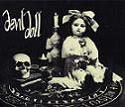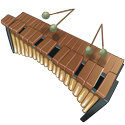|
Abisteen posted:Am I missing something or am I just misunderstanding and it is perfectly fine to play the notes in a chord in any octave? It's perfectly fine, in fact, it's one of many ways to get some variety into your music. I have a feeling you don't realize how "samey" most songs are. Pop songs for sure, but even a lot of classical music is the same chord progression over and over again. For the purposes of theory, it doesn't matter if it goes root, 3rd, 5th, or root, root an octave higher, 3rd an octave above that, 5th somewhere between root and 3rd. It's still a root position chord if the root's on the bottom.
|
|
|
|

|
| # ? May 11, 2024 09:31 |
|
Just since limitations of the instruments was mentioned, wanted to throw out that there's myriad examples of this stuff where it's purely an artistic decision. I know he's a bit cheese ball sometimes but look up Eric Whitacre on YouTube, he really has a knack for cool voicings in a choir context. Plus you can dig up scores and analyze in detail if you want.
|
|
|
|
They're referred to as inversions if you want to research further, move the root an octave higher and it's first inversion, move the third an octave as well and you have the second inversion, move the fifth up too and you're back at the standard chord but an octave higher.
|
|
|
|
Are there any good guides on how to do EQ on a keyboard amplifier? I'm running a Casio PX-5S through an amp, but most of the piano settings sound flat and muddy. I've messed around with the EQ sliders on the amp, but I don't really have a good idea of what I'm doing. Is it better to set the EQ on the amp or just set the amp to flat and do EQ through the keyboard?
|
|
|
|
Vargatron posted:Are there any good guides on how to do EQ on a keyboard amplifier? I'm running a Casio PX-5S through an amp, but most of the piano settings sound flat and muddy. I've messed around with the EQ sliders on the amp, but I don't really have a good idea of what I'm doing. Is it better to set the EQ on the amp or just set the amp to flat and do EQ through the keyboard? I'm not the biggest expert, but I have the same problem and it seems to me like some of the cheaper mid-range keyboard amps like Behringers just make my keys sound boomy/muddy no matter what I do with them. I usually just significantly roll the low end off my in-keyboard EQ, sometimes boost the mid or high slightly. In-keyboard FX like exciters sometimes help sharpen up the sound a little.
|
|
|
|
Drink-Mix Man posted:I'm not the biggest expert, but I have the same problem and it seems to me like some of the cheaper mid-range keyboard amps like Behringers just make my keys sound boomy/muddy no matter what I do with them. I actually have a $200 Behringer so that's probably the majority of the issue. I spoke with a few friends who do home audio production and they recommended dropping out the extreme low frequencies down quite a bit for keyboard.
|
|
|
|
I'm putting together a little amateur home recording studio, and would like to incorporate electric guitar (which means I need to buy an electric guitar). I hope that I can eventually turn this into more than a hobby, but realistically, I'm probably not going to have a ton of time for it and, as such, want to walk a pretty fine line between cost and quality. Looking for feedback on the best way to walk this line. My current thinking is to get whatever electric guitar I want (will probably troll CL for MIM Strats or maybe a Tele if I'm feeling saucy), and pair it with AmpliTube. This saves me from having to buy an amp, which will obviously be a tradeoff in tone, but my impression is that AmpliTube has some pretty good modeling and is probably sufficient for what I'm after. I'll probably mostly play with a pretty clean tone, maybe some light distortion/fuzz and other effects like reverb, delay, etc. Questions: 1) is my assumption about AmpliTube being 'good enough' correct? I don't need it to sound incredible, but I don't want it to sound majorly cheesy either. For reference, I've made some tracks using the pre-built drum kits in Ableton and these leave plenty to be desired, but are pretty much good enough for my purposes. I'm hoping AmpliTube will be comparably 'not great, but good enough', maybe getting a bit closer to 'great' than Ableton's presets for analog instruments 2) if I do go forward with amp modeling as opposed to recording a real amp, are there any implications for what guitar I should buy? Or put another way, is there any reason (related to sound/tone) to choose a different guitar for amp modeling than I would if I were going to use a real amp? Thanks in advance for any insight, ML!
|
|
|
|
1) Amplitube is very nice, particularly if you load up on the expansion packs. I'm a particular fan of the Fender and Ampeg expansions, but that's largely a function of the types of music I do. While there's a certain live nastiness to a recorded guitar amp that you can't entirely duplicate in the box, the truth of it is that getting a good sound out of a recorded amp isn't super easy, and can't always be done cheaply. Before I moved to Oz I had a nice homebrew iso cab and a couple of nice amps and mics, and still I'd end up using Amplitube or Guitar Rig 80-90% of the time because it was just so much easier to dial in a useful sound. It is an absolutely fine place to start, and you will get more versatility for your buck than you will with any amp you could possibly buy. 2) Not so much. I mean yes there are differences in how different guitars/pickups/etc sound, but amp modeling software tends to respond to that in much the same way that a real amp would, so just choose the instrument you'd choose otherwise for your style. I've put out a bunch of generally well-received albums in which most of the electric guitar/bass parts were Amplitube, MIM Strat, and a Fender Jazz bass. e: Also, as someone who's been loving with computer audio since the early 90's lemme just say this: put a high priority on gear that will reduce your latency if you're doing guitar through amp modeling software. It is goddamn hard to play on beat if you've got a significant delay between what your fingers do and what you hear, and you will wreck your tracks trying to compensate. Having moved from a Windows-only studio setup to a Mac-only studio setup I've found that latency issues are MUCH less of a hassle on a Mac, but I've also been out of the Windows world for five years so idk how well that stuff has been dealt recently. Trig Discipline fucked around with this message at 23:09 on Sep 5, 2016 |
|
|
|
Trig Discipline posted:super helpful stuff Thanks a million! That's what I was hoping I'd hear. I've got a Macbook Pro, and back when I first got into home recording a couple years ago, I upgraded to 4GB of RAM. Hopefully it won't be bad, but maybe you'll hear from me again in a few weeks with a latency question!
|
|
|
|
I'm exploring alternate tuning and had some simple, dumb questions I just wanted to clarify to make sure I'm doing it right. C standard is 2 whole steps down from standard E tuning. So if I were to play a typical B chord in E standard, playing the same frets in C standard would be playing a G chord?
|
|
|
|
Kvlt! posted:I'm exploring alternate tuning and had some simple, dumb questions I just wanted to clarify to make sure I'm doing it right. You are correct. Same way as a capo bring everything up a set number of steps.
|
|
|
|
Vargatron posted:You are correct. Same way as a capo bring everything up a set number of steps. Awesome, thank you!
|
|
|
|
Guitar is actually pretty easy when it comes to transposing. The scale patterns don't change so long as the tuning changes and all you have to do is move up and down on the neck to play different keys. It's different from piano in that your fingering and sharp/flats will change as you go to different keys.
|
|
|
|
I have a pair of lovely MTX Thunderpro 12" Sub PA speakers. One of the tweeters apparently went out and I can't find replacement cones online anywhere. Are they the rebuildable kind or am I hosed?
|
|
|
|
My dad used to use Band in a Box in the 90s as automatic accompaniment when he played guitar. He's looking for the modern equivalent of that, some software where you give it a key, start playing, and it comes up with background tracks to play to. He loves his Roland JV-1010 that he's had forever so it doesn't even need samples, just MIDI. Any ideas?
|
|
|
|
Rocksmith 2014 Session Mode?
|
|
|
|
What's the best way to ensure all my tracks come out at a similar level / loudness? Normally I make sure nothing exceeds 0 when doing a render, but they still seem to be really different sounding.
|
|
|
|
well why not posted:What's the best way to ensure all my tracks come out at a similar level / loudness? Normally I make sure nothing exceeds 0 when doing a render, but they still seem to be really different sounding. To give tracks a similar loudness (to each other as well as to chosen reference material) is traditionally the job of a mastering engineer, because it requires listening skills, good (quasi objective) judgement and -commonly- high quality compressors/limiters. It's pretty much a job and an art in and of itself. While the digital mixer in your DAW will most often still use peak metering, some have loudness metering built in on the master bus these days. Loudness metering is also available as a plugin. There's the older K-System and a competing EBU R128 standard that expresses itself in LUFS (loudness units) instead of dB, with varying time windows to average over. Both are attempts to both give you a visual impression of how loud something actually is, but also are an attempt to standardize loudness levels throughout the industry (though conservative recommended peak-to-loudness ratios). These things take into account the sensitivity of the human ear to varying frequencies at varying levels (Fletcher-Munson curve). If you read up on these things, a lot of discussion will concern the standardizing part of that and you might not care that much about it. But you can still use one of those plugins to eyeball loudness levels and do quick adjustments to your mixer levels and master bus compression to get things into the same ballpark. Still listening to what sounds good, obviously! This is all pretty involved and alternatively, a program like iTunes has its own volume leveling and can bring all your music to a similar loudness on playback, though it can only do that by bringing down the level of the loudest tracks; it can't bring up the level of a track that would then clip peaks. Lots of media player programs can do this and some can embed the necessary information in mp3 tags so the file will play back at the same level anywhere, but iTunes is the only one I know that uses the EBU R128 standard. Lots of players use more primitive averaging algorithms. It's a limited solution to the problem anyway, so it depends on what you're actually looking for. Personally, halfway through the mixing, I'll start using a K-meter plugin (because that was the easiest to find for free) to see, mainly, if I'm overdoing all the compression. I'll stick to the K-14 standard in the loudest parts of the music (roughly equivalent to a 14dB peak-to-loudness ratio), which has plenty of dynamic range compared to how electronic music usually is mastered still, while never ending up accidentally being obtrusively quiet. This gives me a fairly consistent starting point to squeeze out a little more in the self styled 'mastering stage' by ear. So basically, the answer is compression, but the metering plugins can help you get more consistent results.
|
|
|
|
Have another question about alternate tuning. I wrote a song in the key of A using E standard tuning. I want to play the song in C standard. I know I could just play the same song except two whole steps up in C standard, but what would happen if I played the song as if it were E standard in C standard? Would it be the same song just in the key of F or would I have to make more adjustments to play the song in the key of F?
|
|
|
|
Your song was in A, and your tuning was E standard. When you retune to C standard, everything you play drops two steps (E -> C) so the same happens to your song if you play it the same way as before. So yeah, it effectively gets transposed to F
|
|
|
|
baka kaba posted:Your song was in A, and your tuning was E standard. When you retune to C standard, everything you play drops two steps (E -> C) so the same happens to your song if you play it the same way as before. So yeah, it effectively gets transposed to F Thank you! I usually write songs in E standard but play them in C standard, so it helps to know I can basically just play them the same but have the key be 2 steps lower.
|
|
|
|
Capos are another way of thinking about it - it's like you move the nut higher, so all the 'open' strings are shifted up however many steps, all the '1st fret' notes by the same amount, and so on, like tuning up. Tuning down is like moving the capo down So if you have one, you can always keep the guitar in C and capo it at the 4th fret, then you've 'tuned up' to E standard. A lot of people do that kind of thing, lots of flexibility! But yeah, playing songs in another key is a great way to change the feel, and it can be super easy on guitar because you can just shift everything up and down. It's not like a piano where you have to compensate for the different pattern of black and white keys
|
|
|
|
Is there a musician's lounge IRC channel?
|
|
|
|
Is there a way to stream from two sources, and what is the process for that? Specifically the screen of my phone and a camera (probably the camera of an old phone, but not necessarily).
|
|
|
|
Obscure question: are there any instruments in current production that resemble the 'Mellophonium' used by Stan Kenton's band in the 60s, as opposed to a more standard 'Mellophone'? I've grown enamored of its strange, particular sound, but have no business playing horn as yet - so if models like that are in production, what price would one expect to pay for a passable instrument to start with in a non-performance capacity? Fully aware this may be a ridiculous question, so thank you for your patience. Info available here (but not much about current models!), and there's a recording of the instrument as a soloist linked in the second-last paragraph of that website for an idea about its tone colour etc.
|
|
|
|
As far as I know, all the bands that go for that sound just use classical French horns nowadays.
|
|
|
|
Luigi Thirty posted:My dad used to use Band in a Box in the 90s as automatic accompaniment when he played guitar. He's looking for the modern equivalent of that, some software where you give it a key, start playing, and it comes up with background tracks to play to. He loves his Roland JV-1010 that he's had forever so it doesn't even need samples, just MIDI. Any ideas? Band In A Box is still around and actively updated. Pretty sure it still looks as fugly as it did in the 90s but apart from that it's terrific. Especially if you want to play stuff other than rock/pop, it has a crazy selection of styles.
|
|
|
|
I do mostly vocal stuff, as such I just use stupid and bad things like audacity. It works for everything I need. However I was trying to do something the other day and could not get it to work. Basically I have two tracks, one is background music that I want to play at a fairly audible level, the other is a spoken word track. I was wondering if there was a technique (other than manually enveloping the entire 2+ hour long clip) to make the the background music track automatically quiet down when the spoken word track was speaking?
|
|
|
|
Knifegrab posted:I do mostly vocal stuff, as such I just use stupid and bad things like audacity. It works for everything I need. However I was trying to do something the other day and could not get it to work. In audio software these are called Automations, you can do them in Audacity: https://www.youtube.com/watch?v=vhZbFaI811w
|
|
|
|
Knifegrab posted:I do mostly vocal stuff, as such I just use stupid and bad things like audacity. It works for everything I need. However I was trying to do something the other day and could not get it to work.
|
|
|
|
Hawkgirl posted:As far as I know, all the bands that go for that sound just use classical French horns nowadays. Thanks, Hawkgirl. That's exactly the sorta context I needed. I'll keep my eye open for a used model!
|
|
|
|
Is there any reason— assuming I'm okay controlling it from another device if necessary— affordable samplers like the SR202, SR505, or Korg Volca sample would't make a decent straight drum machine if I loaded them up with the right kit samples? (IE 808, 909 kits and such.) On a budget, I'm torn between getting a sampler or a strict drum machine and am wondering if there's any reason I wouldn't want to just get a sampler and use it as both.
|
|
|
|
Knifegrab posted:I do mostly vocal stuff, as such I just use stupid and bad things like audacity. It works for everything I need. However I was trying to do something the other day and could not get it to work. Personally, I would stop using Audacity ASAP. It's sort of bad. Try Reaper out instead. I'd bet money that it has what you need and also it'll probably save you some headaches in the long run.
|
|
|
|
Drink-Mix Man posted:Is there any reason— assuming I'm okay controlling it from another device if necessary— affordable samplers like the SR202, SR505, or Korg Volca sample would't make a decent straight drum machine if I loaded them up with the right kit samples? (IE 808, 909 kits and such.) On a budget, I'm torn between getting a sampler or a strict drum machine and am wondering if there's any reason I wouldn't want to just get a sampler and use it as both. If using a sampler, good sequencer workflow is going to be your main concern. Do you mean the Boss SP202/505?
|
|
|
|
NonzeroCircle posted:Do you mean the Boss SP202/505? Yep, my bad.
|
|
|
|
They aren't bad for their age but storage media for older samplers can be a fucker, I had one of the 808s that ran on Zip disks of all things and it was a nightmare sourcing them. Maybe have a look at the Electribe range too if budget allows, they're pretty decent. As for drum machine vs sampler, what is your aim? To make whole tracks or accompaniment?
|
|
|
|
NonzeroCircle posted:They aren't bad for their age but storage media for older samplers can be a fucker, I had one of the 808s that ran on Zip disks of all things and it was a nightmare sourcing them. Just accompaniment. I want to record live keyboard jams and have the drums on a separate channel for ease of remixing later if I so choose. It would be nice to have a decent (or at least unique) enough sound out of the drum box, though, so every drum track I recorded wasn't necessarily a scratch track. I was also considering a sampler, though, because I tend to incorporate some quirky sound effects and field recordings into my tracks and I thought it could be fun to experiment with. And to get it out of the way, I'm considering hardware vs. software because A) it would be nice to play out with the gear if I chose 2) software just doesn't seem to click (no pun intended) with me for various reasons. Drink-Mix Man fucked around with this message at 02:00 on Oct 4, 2016 |
|
|
|
I totally get the hardware thing, was gutted when my DR202 decided to belch out a puff of blue deathsmoke. Its terrible synth samples really bought a jam to life. Seems like you have a good idea of what you want, though personally I'd suggest you get as modern a sampler/sampling groovebox as you can for your budget, if only for storage and compatibility ease of use. It's also worth checking the various ins and outs will make integrating it into your setup easier, saves having to faff with rca to 1/4 inch adapters and whatever. Definitely have a look at the Korg Electribe range, they aren't too bad second hand.
|
|
|
|
NonzeroCircle posted:They aren't bad for their age but storage media for older samplers can be a fucker, I had one of the 808s that ran on Zip disks of all things and it was a nightmare sourcing them. My dad has a shoebox full of Roland S-10 sample disks - 2.8" quickdisks made famous by the Famicom Disk System for the rubber belt turning to goo.
|
|
|
|

|
| # ? May 11, 2024 09:31 |
|
Is there like a goon tour schedule somewhere? It'd be cool to have goons post in threads with like: Genre: Time: Place: etc etc I'd love to go to local goon shows.
|
|
|
































 ~*
~*



